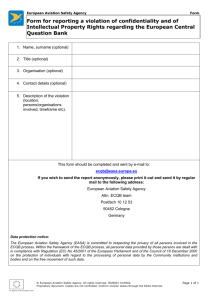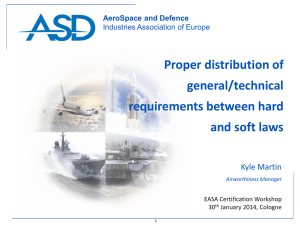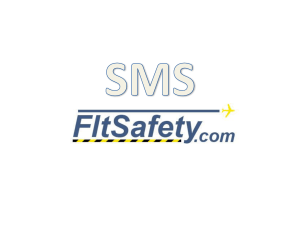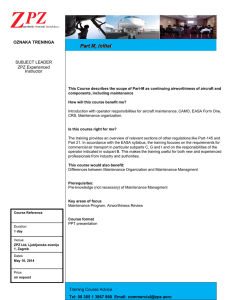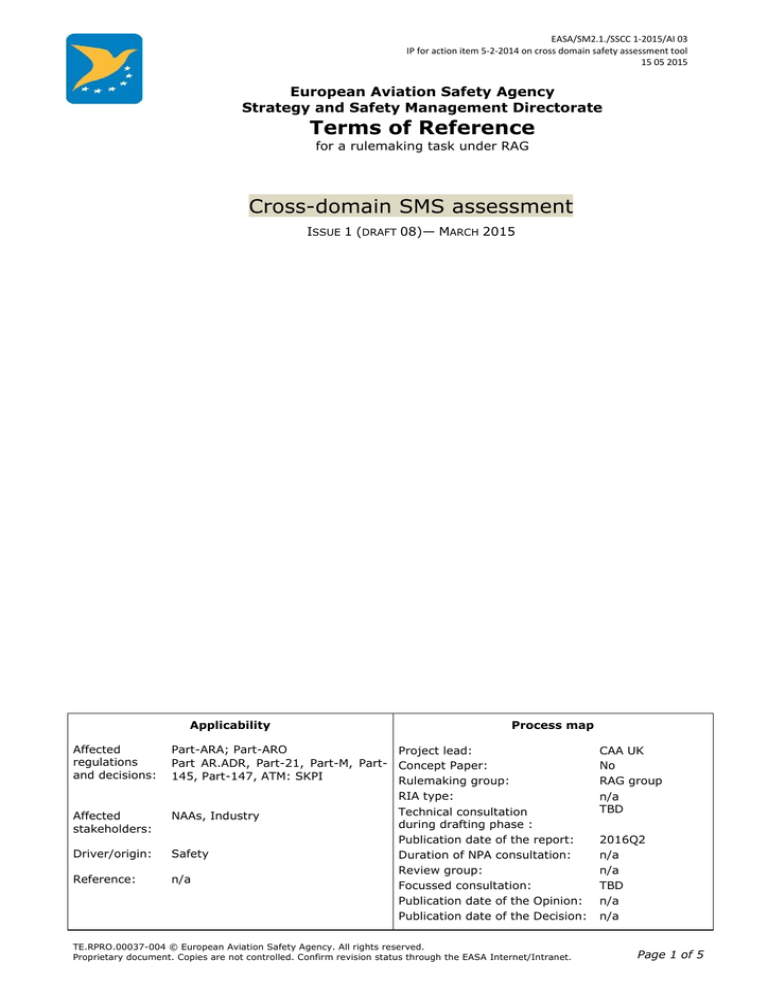
EASA/SM2.1./SSCC 1-2015/AI 03
IP for action item 5-2-2014 on cross domain safety assessment tool
15 05 2015
European Aviation Safety Agency
Strategy and Safety Management Directorate
Terms of Reference
for a rulemaking task under RAG
Cross-domain SMS assessment
ISSUE 1 (DRAFT 08)— MARCH 2015
Applicability
Affected
regulations
and decisions:
Affected
stakeholders:
Driver/origin:
Reference:
Process map
Part-ARA; Part-ARO
Project lead:
Part AR.ADR, Part-21, Part-M, Part- Concept Paper:
145, Part-147, ATM: SKPI
Rulemaking group:
RIA type:
Technical consultation
NAAs, Industry
during drafting phase :
Publication date of the report:
Safety
Duration of NPA consultation:
Review group:
n/a
Focussed consultation:
Publication date of the Opinion:
Publication date of the Decision:
TE.RPRO.00037-004 © European Aviation Safety Agency. All rights reserved.
Proprietary document. Copies are not controlled. Confirm revision status through the EASA Internet/Intranet.
CAA UK
No
RAG group
n/a
TBD
2016Q2
n/a
n/a
TBD
n/a
n/a
Page 1 of 5
European Aviation Safety Agency
1.
EASA/SM2.1./SSCC 1-2015/AI 03
IP for action item 5-2-2014 on cross domain safety
assessment tool
Issue and reasoning for regulatory change
ICAO Annex 19 promotes a common approach to safety management and safety
oversight.
The EASA authority and organisation requirements mandate (cf. Regulations 290/2012;
965/2012 and 139/2014) or will mandate (initial and continuing airworthiness, cf.
Rulemaking Tasks MDM.055 and MDM.060) that organisations monitor the effectiveness of
their SMS and that competent authorities assess SMS as part of their oversight. While the
ANS Performance scheme provides a tool to assess the effectiveness of SMS, there is no
such EASA methodology or tool available for the other Agency domains where SMS
requirements have been or will be introduced.
The SMICG, of which EASA is a founding member, has developed a tool to enable a
harmonised approach to SMS oversight globally, establishing an equivalent ‘standard’ of
SMS oversight internationally. A number of EASA States are implementing SMS
assessment methodologies based on the SMICG tool.
2.
Objectives
The objective of this task is to create a cross-domain SMS assessment methodology and
related tools (guidance) focusing both on assessment and continual improvement within
the scope of authority oversight.
Such single assessment methodology shall be consistent with the EASA management
system requirements and the ATM/ANS Performance Scheme in Reporting Period 3 (RP3)
The assessment methodology shall not affect RP2 monitoring as the existing EoSM
indicator remains applicable until the end of the Second Reference Period (2019).
A common approach to assessing SMS effectiveness will have a positive safety impact
through:
promoting SMS within the different domains;
supporting competent authorities to evolve from traditional, compliance based
oversight to performance-based oversight;
providing a common baseline for SMS effectiveness assessment;
creating a sound basis for mutual acceptance of SMS under bilateral agreements.
Devising a single assessment methodology and tool meeting both the ANS Performance
Scheme and the EASA requirements would ensure a harmonised and consistent evaluation
of safety management systems within the wider EASA regulatory construct. A harmonised
base will also support the further development of Member State SSP and safety plans
along with the development of EASA’s Safety-risk Portfolio.
In contrast, the retention of a separate ATM/ANS SMS tool increases the risk of
incongruities between approaches and has the potential to increase the reporting burden
on States.
3.
Activities
The proposed working method for this rulemaking task is: GROUP.
The first phase of the process will:
TE.RPRO.00037-004 © European Aviation Safety Agency. All rights reserved.
Proprietary document. Copies are not controlled. Confirm revision status through the EASA Internet/Intranet.
Page 2 of 5
European Aviation Safety Agency
EASA/SM2.1./SSCC 1-2015/AI 03
IP for action item 5-2-2014 on cross domain safety
assessment tool
define the scope of the task in terms of domains to be addressed:
o ATM/ANS
o Aircrew
o Air Operations
o Aerodromes
o Initial Airworthiness
o Continuing Airworthiness
o Ground Handling
take the SMICG evaluation tool as a baseline,
conduct research to identify other existing methods and tools to assess SMS
effectiveness
agree on the set of additional criteria for the assessment (EoSM, etc…)
The second phase will be to define the methodology, tools, recommend SMS metrics and
develop guidance.
A limited number of pilot projects could be launched, time permitting.
This phase should also determine if additional domain specific assessment criteria should
be included and how to include them.
This phase will end with the publication of a report for RAG & TAG consultation.
The third phase will consist in reviewing comments and finalising the methodology and
tools.
During the second and third phase, use may be made of focused consultation where
necessary.
Tentative planning :
2014
Q1
preparation - discussions with RAG/EC
agree ToRs
meeting 01: 13/11/2014
research phase
meeting 02: 05/02/2015
consolidate research results, agree on assessment criteria
develop method & tools, provide GM
draft report and consult stakeholders (RAG/TAG)
finalise method, tools and GM , recommend rule structure & format
4.
Q2
2015
Q3
Q4
Q1
Q2
2016
Q3
Q4
M04
M05
Q1
Q2
Q3
Q4
M01
M02
M03
M06
M07/08
Reporting
Intermediate reports on work progress will be provided to RAG and TAGs on a regular basis.
5.
Deliverables
A. Report describing the cross-domain SMS assessment methodology and providing the
related tools and guidance, in particular in relation to the use of the method (training
and qualification).
B. Recommendation on the rule structure and format (Implementing Rule versus AMC/GM)
and proper referencing with regards to related implementing rules for each domain.
TE.RPRO.00037-004 © European Aviation Safety Agency. All rights reserved.
Proprietary document. Copies are not controlled. Confirm revision status through the EASA Internet/Intranet.
Page 3 of 5
European Aviation Safety Agency
6.
EASA/SM2.1./SSCC 1-2015/AI 03
IP for action item 5-2-2014 on cross domain safety
assessment tool
Interface issues
Close coordination with any ongoing rulemaking task to review the ATM/ANS Performance
IR objectives will be ensured (via TAG and EASA Rulemaking coordination). The work of the
group should make recommendations to the SES Performance Scheme in order to avoid
any duplication or interference.
The work of the ICAO Annex 19 Panel (Safety Management Panel) and of the SMICG will be
monitored.
NB: The ICAO SMP will carry out a review of the SMICG tool in view of proposing the
incorporation of SMS assessment guidance into the Safety Management Manual (Doc.
9859).
7.
Focussed consultation
Focused consultation in the form of specific meetings
representative bodies will be organised where necessary.
with
selected
stakeholder
Consultation of competent authorities may be ensured through the regular Standardisation
meetings and workshops.
8.
Profile and contribution of the group
The group includes representatives of the different technical domains as defined in section
3.
To properly address issues related to international harmonisation/mutual acceptance of SMS
the FAA SMICG representative has been invited to participate and a relationship with the
SMICG will be maintained.
TE.RPRO.00037-004 © European Aviation Safety Agency. All rights reserved.
Proprietary document. Copies are not controlled. Confirm revision status through the EASA Internet/Intranet.
Page 4 of 5
European Aviation Safety Agency
9.
EASA/SM2.1./SSCC 1-2015/AI 03
IP for action item 5-2-2014 on cross domain safety
assessment tool
Annex I: Reference documents
9.1. Affected regulations
n/a
9.2. Affected decisions
Decisions with AMC and GM to:
Part-ARA
Part-ARO
Part-21
Part-M
Part-145
Part-147
Part ADR.AR
Part ATM/ANS.AR
Part ATCO.AR
9.3. Reference documents(initial list)
SMICG SMS evaluation tool
ATM Performance EoSM & Just Culture questionnaires
IATA SMS assessment tools (IOSA, ISAGO)
CANSO Standard of Excellence in SMS
TE.RPRO.00037-004 © European Aviation Safety Agency. All rights reserved.
Proprietary document. Copies are not controlled. Confirm revision status through the EASA Internet/Intranet.
Page 5 of 5

